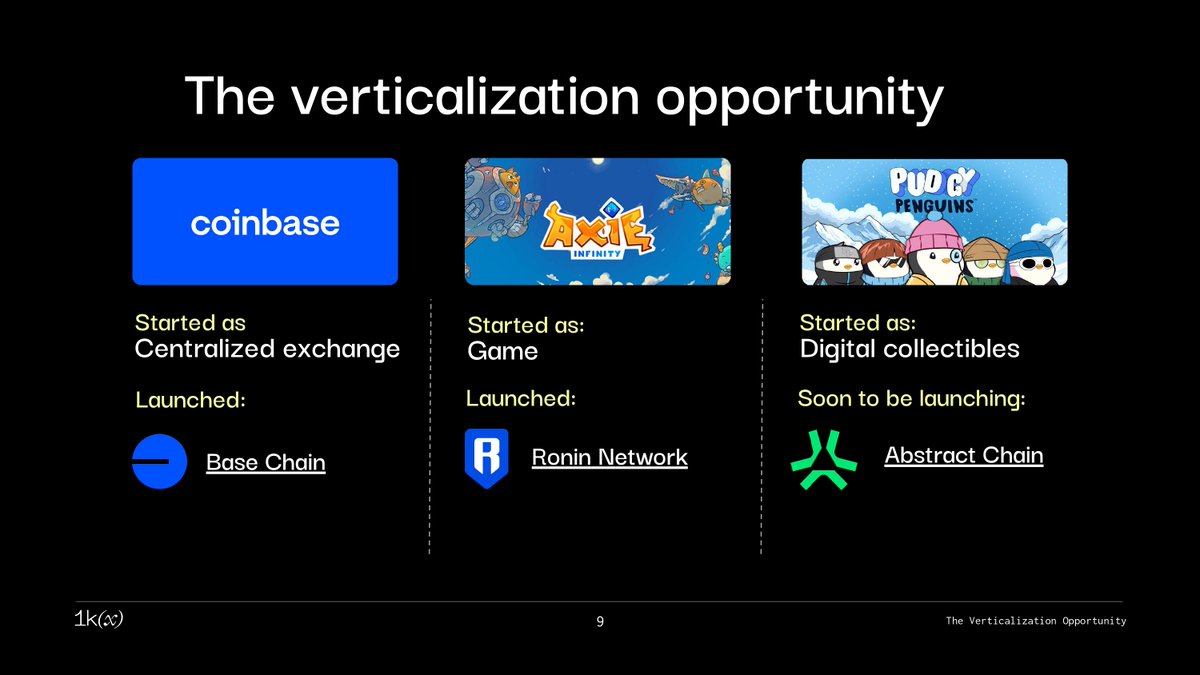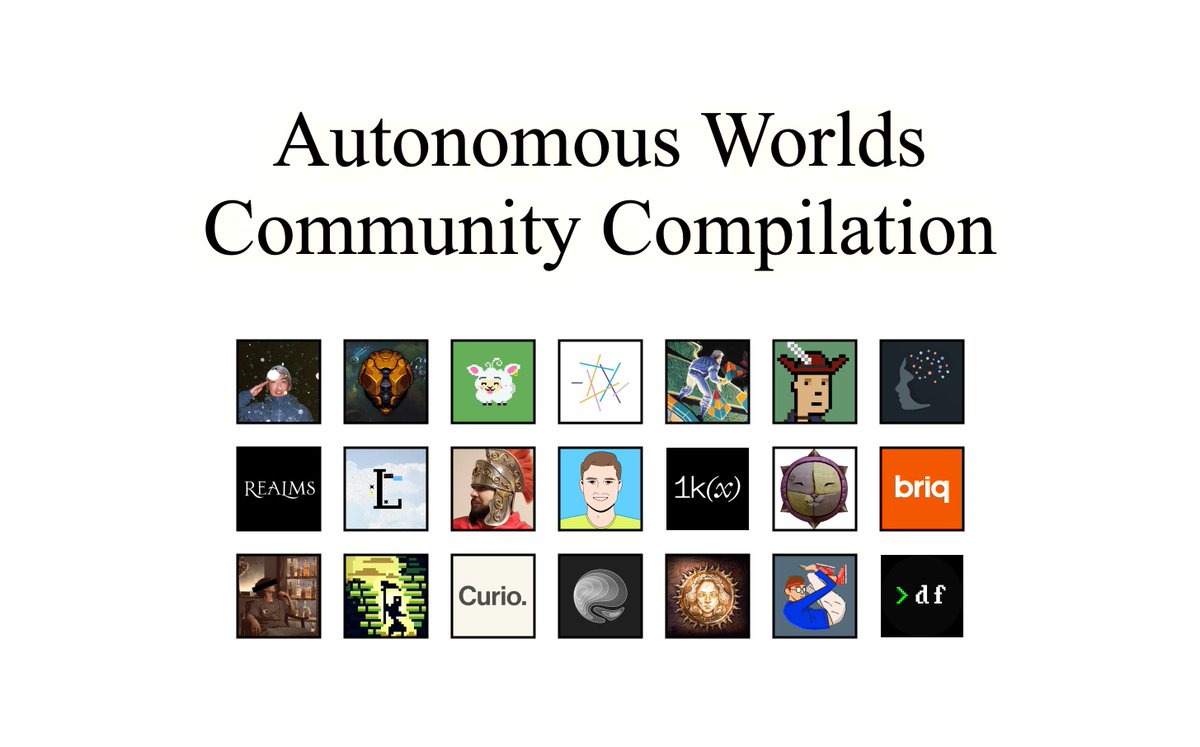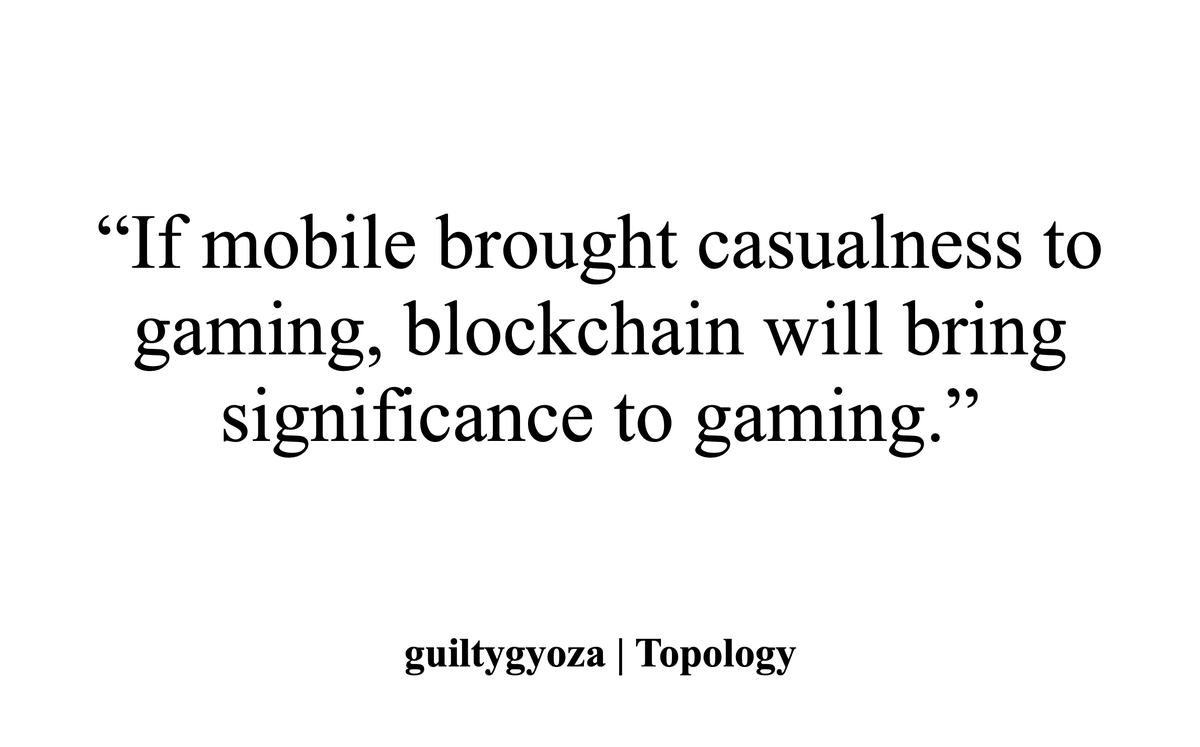Thesis: The Consumer Crypto Opportunity
First originally presented to @1kxnetwork's LPs last year on why we take consumer crypto so seriously. This is the opportunity that we see.
First originally presented to @1kxnetwork's LPs last year on why we take consumer crypto so seriously. This is the opportunity that we see.

1. Whenever a new platform emerges, new winners are always created, whereas incumbents misunderstand the opportunity, are too slow, or simply misexecute. New paradigms require new mental models and new playbooks.
We saw this with games and video over the last decade.
We saw this with games and video over the last decade.

2. We saw this with the emergence of mobile games.
In the 2000s, hardcore games dominated the gaming industry. Players sought higher immersive experiences with high-fidelity graphics. Mobile represented the antithesis of this, being a far smaller, non-performant device with little high-quality content created for it. Gamers back then didn't care, so neither did the biggest game publishers at that time.
Despite the lack of existing industry interest, the potential of mobile was undeniable. It would go on to allow people to play games anywhere with anyone else on the internet in a highly casual manner, spawning the mobile free-to-play category. This created an entirely new market of players that never existed before.
And naturally, new winners emerged soon after. Ones that were entirely built off games that did not look like the winners of the prior generation, and with gamers that did not consider themselves gamers.
"These aren't real games and these aren't real gamers"
In the 2000s, hardcore games dominated the gaming industry. Players sought higher immersive experiences with high-fidelity graphics. Mobile represented the antithesis of this, being a far smaller, non-performant device with little high-quality content created for it. Gamers back then didn't care, so neither did the biggest game publishers at that time.
Despite the lack of existing industry interest, the potential of mobile was undeniable. It would go on to allow people to play games anywhere with anyone else on the internet in a highly casual manner, spawning the mobile free-to-play category. This created an entirely new market of players that never existed before.
And naturally, new winners emerged soon after. Ones that were entirely built off games that did not look like the winners of the prior generation, and with gamers that did not consider themselves gamers.
"These aren't real games and these aren't real gamers"

4. Similarly, we saw a similar pattern of disruption with online video.
While network TV was the main form of media consumption globally, its flaws were obvious. It was permissioned, expensive to produce, and distribution limited to local or regional. Despite this, entertainment executives similarly dismissed video as a losing content form factor.
Online video's potential was clear to the few that paid attention. It was a content platform that was permissionless with no barriers to entry and global from day one. The implications of this were massive.
Naturally, entertainment was disrupted, new winners in media emerged, and similar to mobile games, looked nothing like the content that popularized the former platform. New entertainment stars and brands emerged (Mr. Beast, Bella Poarch, ...) and so did entire new businesses that were built off the distribution channels of online video (Shein).
While network TV was the main form of media consumption globally, its flaws were obvious. It was permissioned, expensive to produce, and distribution limited to local or regional. Despite this, entertainment executives similarly dismissed video as a losing content form factor.
Online video's potential was clear to the few that paid attention. It was a content platform that was permissionless with no barriers to entry and global from day one. The implications of this were massive.
Naturally, entertainment was disrupted, new winners in media emerged, and similar to mobile games, looked nothing like the content that popularized the former platform. New entertainment stars and brands emerged (Mr. Beast, Bella Poarch, ...) and so did entire new businesses that were built off the distribution channels of online video (Shein).

6. Blockchains are a new platform for consumers.
They enable us to build with digital property rights and programmable incentive models on a permissionless and global stage from day 0.
I believe that this will lead to net new innovations in games, social, creator economy, and the formation of new markets that we've never seen before.
Similarly to mobile gaming and online video, I also strongly believe disruption will happen with content that looked nothing like the content of past platforms and be responsible for net new market creation with new users that looked nothing like the ones of the past.
They enable us to build with digital property rights and programmable incentive models on a permissionless and global stage from day 0.
I believe that this will lead to net new innovations in games, social, creator economy, and the formation of new markets that we've never seen before.
Similarly to mobile gaming and online video, I also strongly believe disruption will happen with content that looked nothing like the content of past platforms and be responsible for net new market creation with new users that looked nothing like the ones of the past.

7. Consumer crypto winners that emerge will grow to become bigger than ever before as they are able to permissionlessly verticalize down the stack.
The biggest winners traditionally have been those that were able to verticalize down the stack. Amazon is a great example of this, where while it found initial PMF as a consumer marketplace, AWS is what drives 70-80% of the company's operating profits (despite only being 15-17% of its revenue).
Every consumer winner looks to verticalize but is heavily constrained by the technical cost to do so.
Unlike Web2, the open-source nature of Web3's tech stack allows for winners to effortlessly verticalize down the stack as it grows to further capture aspects of the value chain, capture economies of scale, and monetize far more flexibly.
This allows winners in consumer crypto to grow faster and become bigger than ever before, especially in comparison to their Web2 counterparts.
The biggest winners traditionally have been those that were able to verticalize down the stack. Amazon is a great example of this, where while it found initial PMF as a consumer marketplace, AWS is what drives 70-80% of the company's operating profits (despite only being 15-17% of its revenue).
Every consumer winner looks to verticalize but is heavily constrained by the technical cost to do so.
Unlike Web2, the open-source nature of Web3's tech stack allows for winners to effortlessly verticalize down the stack as it grows to further capture aspects of the value chain, capture economies of scale, and monetize far more flexibly.
This allows winners in consumer crypto to grow faster and become bigger than ever before, especially in comparison to their Web2 counterparts.

8. We've seen this process of verticalization play out already.
@Coinbase initially finding traction as a CEX, to then launch @Base
@AxieInfinity leveraging its playerbase to launch @Ronin_Network
@PudgyPenguins using its distribution funnel to launch @AbstractChain
@LINEjp_official + @kakaoteam leveraging its users to launch @KaiaChain
The biggest consumer platforms in the future will first start out as applications or IP/content at the earliest stages, and start user first.
@Coinbase initially finding traction as a CEX, to then launch @Base
@AxieInfinity leveraging its playerbase to launch @Ronin_Network
@PudgyPenguins using its distribution funnel to launch @AbstractChain
@LINEjp_official + @kakaoteam leveraging its users to launch @KaiaChain
The biggest consumer platforms in the future will first start out as applications or IP/content at the earliest stages, and start user first.

• • •
Missing some Tweet in this thread? You can try to
force a refresh
















